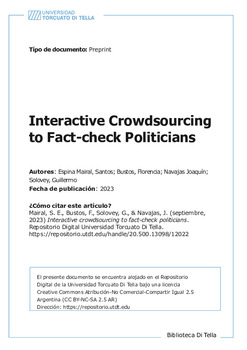Mostrar el registro sencillo del ítem
Interactive Crowdsourcing to Fact-check Politicians
| dc.rights.license | https://creativecommons.org/licenses/by-sa/2.5/ar/ | es_AR |
| dc.contributor.author | Espina Mairal, Santos | es_AR |
| dc.contributor.author | Bustos, Florencia | es_AR |
| dc.contributor.author | Solovey, Guillermo | es_AR |
| dc.contributor.author | Navajas, Joaquin | es_AR |
| dc.date.accessioned | 2023-09-05T16:27:16Z | |
| dc.date.available | 2023-09-05T16:27:16Z | |
| dc.date.issued | 2023 | |
| dc.identifier.uri | https://repositorio.utdt.edu/handle/20.500.13098/12022 | |
| dc.description.abstract | The discourse of political leaders often contains false information that can misguide the public. Fact-checking agencies around the world try to reduce the negative influence of politicians by verifying their words. However, these agencies face a problem of scalability and require innovative solutions to deal with their growing amount of work. While previous studies have shown that crowdsourcing is a promising approach to fact-check news in a scalable manner, it remains unclear whether crowdsourced judgements are useful to verify the speech of politicians. This paper fills that gap by studying the effect of social influence on the accuracy of collective judgements about the veracity of political speech. In this work, we performed two experiments (Study 1: N=180; Study 2: N=240) where participants judged the veracity of 20 politically balanced phrases. Then, they were exposed to social information from politically homogeneous or heterogeneous participants. Finally, they provided revised individual judgements. We found that only heterogeneous social influence increased the accuracy of participants compared to a control condition. Overall, our results uncover the effect of social influence on the accuracy of collective judgements about the veracity of political speech and show how interactive crowdsourcing strategies can help fact-checking agencies | es_AR |
| dc.description.sponsorship | La versión final de este preprint se encuentra publicada como artículo en el Journal of Experimental Psychology: Applied | es_AR |
| dc.description.uri | https://psycnet.apa.org/doi/10.1037/xap0000492 | |
| dc.format.extent | 51 p. | es_AR |
| dc.format.medium | application/pdf | es_AR |
| dc.language | eng | es_AR |
| dc.publisher | Journal of Experimental Psychology: Applied | es_AR |
| dc.rights | info:eu-repo/semantics/openAccess | es_AR |
| dc.subject | Social Influence | es_AR |
| dc.subject | Crowdsourcing | es_AR |
| dc.subject | fact-checking | es_AR |
| dc.subject | Interactive | es_AR |
| dc.subject | Political Speech | es_AR |
| dc.title | Interactive Crowdsourcing to Fact-check Politicians | es_AR |
| dc.type | info:eu-repo/semantics/preprint | es_AR |
| dc.type.version | info:eu-repo/semantics/submittedVersion | es_AR |

